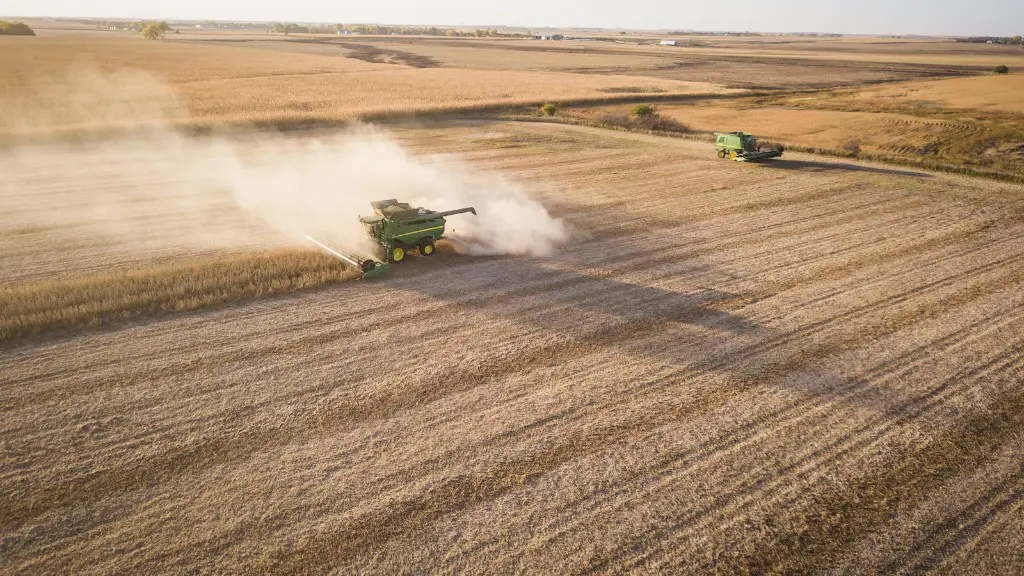Agriculture is vital to the economic and social advancement of many nations around the world. It not only is responsible for providing food and fodder for the populace, agricultural activities also help farmers make a living, enable countries to reach their food security objectives and facilitate regional trade. Here we will cover some of the main benefits offered by agriculture.
One key benefit of agriculture is that it provides food. Growing a variety of food items allows people to put together different meals and have a balanced diet. Modern-day science has also enabled us to achieve better yields from the same acreage, allowing us to produce more food for consumption.
The second benefit is that it provides employment to a large number of people around the world. Whether it’s agricultural activities or services related to agriculture, the economic activity provided by the agricultural sector helps keep people employed and significantly contributes to global economic growth.
Agriculture also helps improve the quality of the environment. Apart from growing food and fodder, it also facilitates the management of water resources and helps in preventing soil erosion. Additionally, better farming practices, such as crop rotation and diversification of crops, help boost the soil fertility.
Finally, agricultural activities support rural development, which is necessary to ensure an equitable and balanced development among various social strata. People who are engaged in agricultural activities in a region have access to better infrastructure, such as roads and markets, medical care, and education.
The Benefits of Agricultural Exports
Agricultural produce can be exported to other countries, which can provide a significant source of income for the domestic economy. Many countries around the world are heavily dependent on the export of agricultural products to meet their foreign exchange requirements. This helps create employment opportunities and additionally boosts the GDP of the exporting nation.
Agricultural exports can also help countries earn valuable foreign exchange reserves in an era of rapid globalization. This exchange can then be used to purchase products from other countries, helping facilitate the spread of modernity and progress.
Agricultural exports also promote economic autonomy among the exporting nations. They provide a strong revenue base, which helps increase the nation’s bargaining power in world markets. This further encourages private investments and foreign direct investments, further helping the country’s economy.
Finally, agricultural exports help expand inter-regional trade options, reducing or eliminating the need for barter trades or switching to less favourable options. This strengthens the bilateral ties between nations and constructs strong economic relationships. This is particularly beneficial for the nations that primarily depend upon primary agricultural exports.
The Benefits of Agricultural Technology
The emergence and continual development of advanced agricultural technology has significantly helped increase the yield of various crops. Producers are now able to produce higher-quality crops, while significantly reducing the wastage that was seen with conventional farming methods.
Modern agricultural technologies also help farmers save money by reducing the cost of production. With the aid of these technological innovations, farmers are now able to cut on labour costs, reduce pest and disease management costs, and avoid or reduce the wastage on inputs..
Agricultural technology has opened up a wide range of new opportunities for farmers, including the ability to cultivate exotic and specialty crops. These crops have the potential to bring in more revenues for the farmers and also enable them to explore other untapped regional markets.
The use of advances in agricultural technology has also been beneficial in reducing the amount of pollutants that are generated from agricultural activities. This is mostly due to enhanced water and soil management, improved pest control and improved fertilizer use efficiency.
Finally, technological advancements in the agricultural sector have greatly improved overall visibility in the global market. This has significantly boosted agricultural exports and also provided consumers with access to fresh, wholesome and safe food products.
The Benefits of Agricultural Infrastructure
Agricultural infrastructure talks about the various services, trusts and organizations that support the agricultural sector. It deals with water supply, transportation, communication, storage and packing facilities, credit networks, marketing and quality control systems that facilitate the various activities of farming.
Agricultural infrastructure helps farmers access inputs and technology easier and at a lower cost so that it encourages the practice of farming. The infrastructure provides necessary support in terms of mechanization, storage, irrigation, power generation and even the setting up of market linkages for the sale and consumption of crop produce.
Agricultural infrastructure also helps reduce the burden of agricultural production by promoting increased mechanization and the use of new technologies. This helps reduce the labour intensity of agricultural activities, enabling farmers to save their time and energy while increasing their productivity and incomes.
The infrastructure also helps improve the quality of produce and reduces wastage during the production, storage and transportation of farm produce. This also helps to fetch better prices in the market which greatly helps farmers.
Finally, improved agricultural infrastructure helps in creating better access for value addition processes, allowing for the production of finished goods that command a premium in the export market. This helps bring in higher amounts of foreign exchange for the country.
The Benefits of Agribusiness
Agribusiness refers to the corporate sector of agricultural activities. It deals with the processing, packaging, marketing and distribution of agricultural produce. This is a much needed activity as it helps farm produce reach consumers without any wastage or spoilage.
Agribusiness helps reduce the prices of agricultural produce as well, making it more affordable for consumers. Farmers are also benefited as they are able to receive better prices in the market, while the investment of large corporations helps in technology transfer and skill development.
Agribusiness has also helped the agricultural sector bring in much-needed foreign exchange. The export of agri-products is an important contribution to a nation’s GDP and can also help fight poverty in the rural areas.
The emergence of agribusiness has also been beneficial in curtailing food adulteration, which was a common occurrence with the existing traditional marketing system. Agribusiness companies are governed by stringent laws and regulations that ensure the quality of food produce.
Finally, agribusiness has helped in providing better food security by managing resources effectively and by distributing the food produce in a more efficient manner. The use of modern packing and storage systems has also helped reduce the wastage of food produce.





